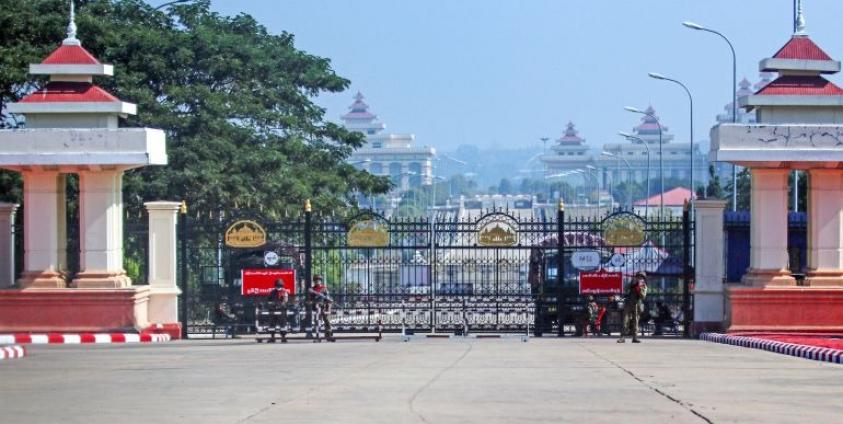Three years since staging the coup, the Junta has ordered the preparations to bolster military fortifications in Naypyidaw, the capital and its headquarters, after a string of battlefield defeats.
The Ayeyarwaddy Times reported on February 25th ,according to sources inside the military, the Military Council has directed the regional commands in Yezin and Pyinmana townships, neighboring Naypyidaw, to formulate strategies for robust defense and counterattacks.
To enhance coordination and communication among battalions, boost operational effectiveness, and efficiently deploy reinforcements, the Military Council has directed the drafting of military strategy proposals since February 20th, with the most potent plans slated for implementation.
Naypyidaw, designated as a key military region, operates directly under the Naypyidaw Regional Command, encompassing 3 tactical operation commands and 10 infantry and light infantry battalions. Furthermore, Theahpyu village in Pyinmana Township, near Naypyidaw, hosts the headquarters of the No. 6 Tactical Operation Command, overseeing another 10 infantry and light infantry battalions.
As the Junta faces a string of battlefield losses nationwide, casualties have surged, and thousands of soldiers have surrendered. Furthermore, with the loss of over 40 towns across Myanmar, the Junta is now scrambling to fortify Naypyidaw as its last stand.
In late November of last year, The Ayeyarwaddy Times reported that, since later 2023, the Military Council had relocated around 14,000 soldiers, selected from various battlefronts across the nation, to barracks in the capital city of Naypyidaw.
This strategic move was aimed at safeguarding the headquarters of the coup regime.
Padoh Saw Taw Nee, spokesperson for the Karen National Union (KNU), a significant player in the revolution, remarked that the focus of the anti-Junta movement should now shift towards strategizing, how to breach the defensive fortifications surrounding the Junta's stronghold in Naypyidaw ?
The KNU currently has no intention of launching offensives to capture towns, but it is crucial to be prepared to strike Naypyidaw with ruthless precision if necessary, adapting to rapidly changing circumstances, he pointed out.
Military and political researcher U Than Soe Naing noted that at present, only the KNU is contemplating an attack on Naypyidaw, however the feasibility of this plan hinges heavily on the involvement of other resistance factions.
"To launch an offensive on Naypyidaw, the first step is to gain control of the Mandalay Region. Once that is achieved, the next objective is to secure the military regions in Pyinoolwin. Although KNU is contemplating an advance towards Naypyidaw, the success of this endeavor largely depends on strategic cooperation with other resistance forces”, he emphasized.
Presently, the territories controlled by the resistance forces in the Bago Region and at the Shan-Karenni border are merely 70 to 100 miles away from Naypyidaw.
Hence, to reclaim the military regions held by the resistance forces in close proximity to Naypyidaw, the Military Council is resorting to desperate counterattacks, employing a mix of heavy shelling and airstrikes.
Former Captain Lin Htet Aung, a participant in the Civil Disobedience Movement (CDM), noted that while it is understandable for the Junta, currently grappling with a series of military setbacks to fortify Naypyidaw extensively, there may be limits on their ability to mount a significant counter-offensive.
"Given the Junta's continuous losses in various frontlines, it appears to be preparing for a final stand. As we have witnessed, its defensive measures are faltering in many regions, prompting Naypyidaw to bolster its defenses. However, if a counter-offensive is planned, the Junta may encounter limitations. Its soldiers are grappling with poor ability, morale, and strategy, suggesting that shifting from defense to offense could be constrained”, he pointed out.
Meanwhile the Junta grappling with a critical manpower shortage, revealed on February 10th its intention to implement the military draft law, which has lain dormant for over a decade, aiming to conscript approximately 60000 personnel.
The National Unity Government (NUG) has rallied behind the battle-cry, 'All Roads Lead to Naypyidaw,' aiming to make 2024 a pivotal year in defeating the military dictatorship. Prime Minister Mahn Win Khaing Than has also announced NUG's readiness to enhance military cooperation with allies.







